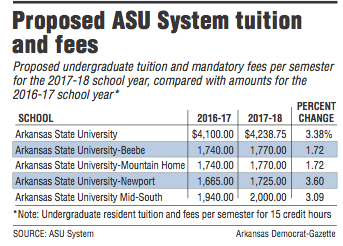The Arkansas State University System is asking its board to increase tuition and fee rates for its five schools, including the four-year campus in Jonesboro.
For Arkansas State University, system administrators have planned an $8 bump in the tuition to a rate of $210 per credit hour and a $1.25 increase in the mandatory academic-excellence fee to a rate of $7.25 per credit hour. In total, the system is asking for a 3.38 percent jump in tuition and fee rates.
The board of trustees will take up the matter -- along with the school's proposed $206.9 million budget -- today at the Arkansas State University-Newport campus. If the board approves the rates, an undergraduate resident student taking 15 hours a semester at the Jonesboro campus will pay $4,238.75 in the 2017-18 academic year, compared with the $4,100 the student paid in 2016-17.
Jeff Hankins, the system's vice president for strategic communications and economic development, did not make available ASU System President Chuck Welch on Wednesday. Welch will address the board today and will be available after the board meeting, Hankins said.
Administrators at the Jonesboro campus referred questions to Welch.
The tuition and fee request comes as higher-education leaders across the nation are focusing on access, success and affordability for their students.
In Arkansas, the three areas are the focus of a new state funding method for public colleges and universities that is set to start July 1, 2018. Gov. Asa Hutchinson has pledged to submit a budget with an additional $10 million in state money -- a first for higher education in the state in nearly two decades -- to help start the new funding method.
Nationwide -- including in Arkansas -- colleges and universities have become more dependent on tuition and fee revenue as state appropriations have dropped or stagnated through the years and as operating costs continue to climb. Higher-education institutions also get income from private donations.
Former Arkansas Gov. Mike Beebe -- an Arkansas State University graduate in 1968 -- said Wednesday that he understood why the ASU System wants to raise tuition.
"State support has stagnated," he said. "Everything is going up. Salaries, utilities, cost of operations.
"The only place universities can get it is by raising fees and tuition."
Arkansas ranked 17th in the nation in terms of lowest average in-state tuition and fee costs for the 2016-17 school year, according to The College Board's annual survey of colleges. The lowest was Wyoming, with an average in-state tuition and fee cost of $5,060, and the highest was New Hampshire at $15,650.
Arkansas ranked 35th, though, with a 16 percent increase in the average in-state tuition and fee costs over five years, according to The College Board's data.
ASU's proposed tuition and fee percentage increase is the fourth-lowest among four-year public universities in the state, a list that ranged from a low of 1.83 percent at Southern Arkansas University in Magnolia to a high of 8.02 percent at the University of Arkansas at Pine Bluff.
If the proposal is approved, ASU -- the state's second-largest university with 14,085 students -- will fall in the middle in terms of cost among the 10 public universities within Arkansas.
With the additional funds, the university plans to continue support for institutional and performance scholarships and enhance campus security, according to board documents. The university is also seeking to use funds for faculty equity and promotions, along with payments for inflationary increases in insurance premiums and accreditation costs, the board documents state.
The university wants to give 2 percent merit raises to faculty members and nonclassified staff, which includes administrators, and a 2 percent cost-of-living increase for classified staff members. The cost-of-living increase would be the first since the passage of Act 599 of 2017, which moved those employees from under the Office of Personnel Management into the state Department of Higher Education's purview.
Before Act 599, universities were at the mercy of the Personnel Management office, which is under the state Department of Finance and Administration, in giving out pay raises for classified staff, Welch told trustees at a February work session in Mountain Home. Welch said then that the change would allow schools to treat every individual fairly.
Board documents also show the Jonesboro campus has $246.8 million in deferred maintenance of its buildings, with $18.4 million listed as critical. The university is setting aside $2.5 million for deferred maintenance projects and is prioritizing projects over $50,000.
For its two-year schools, the ASU System is proposing:
• Raising resident tuition at ASU-Beebe from $98 to $100 per credit hour and keeping steady its mandatory fees. Tuition and fee rates would increase by 1.72 percent.
• Increasing resident tuition at the Mountain Home campus from $94 to $96 per credit hour and maintaining its mandatory fees. Tuition and fee rates would increase by 1.72 percent.
• Raising resident tuition at ASU-Newport from $93 to $96 per credit hour and adding a new mandatory campus safety fee of $1 per credit hour. Tuition and fee rates would increase by 3.6 percent.
• Increasing out-of-district resident tuition at Arkansas State University Mid-South from $110 to $112 per credit hour and increasing the technology fee by $2 to $10 per credit hour. Tuition and fee rates would increase by 3.09 percent.
A Section on 06/08/2017

